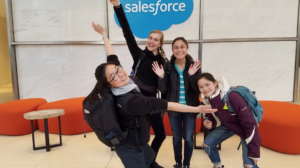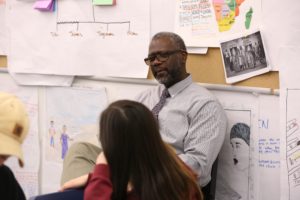Fewer than one in five people who graduate with a degree in Computer Science are female. It has been Reshma Saujani’s mission since beginning the all-female computer science organization, Girls Who Code, in 2012 to help close this gender gap and achieve gender parity in the STEM field by 2027. Since establishing the organization, 90,000 girls and young women, elementary to college age, have become members.
Girls Who Code has set up clubs all around the United States, specializing in after school programs for girls in 6th to 12th grade. During the school year, each club meets approximately two hours per week. The meetings are held at schools, local libraries, and community centers. Besides the curriculum the organization offers during the school year, the program also holds two-week programs during the summer at schools and universities all across America to teach girls the basics of computer science and coding.
One of the most exciting opportunities the program has to offer is a summer immersion program at some of the biggest companies in the world for young women in the 11th and 12th grades. Some of the companies affiliated with the Girls Who Code summer immersion include Facebook, Pixar, Microsoft, GoDaddy, Twitter, and Warner Bros—as well as many other major businesses. From 9:00 a.m. to 4:00 p.m., girls participating in the program spend their day learning different coding languages such as JavaScript, Java, Django, and Python and go on field trips to tech events such as the Salesforce Trailhead Conference. Andrea Baldizon ‘19, who participated in the Summer Immersion progra

m last year at the software company Autodesk described the experience of working in an all-female environment at the head of a major company. “It was inspiring to see women of different backgrounds holding leadership positions in a male dominated industry, especially women of color. This experience has given me a sense of hope for closing the gender gap in tech. Investment companies like Autodesk are willing to contribute their space and resources for non- profit organizations such as Girls Who Code.”
The program also allows young women to get involved with the organization in their own communities by starting clubs at their high schools. Lick- Wilmerding has started its own Girls Who Code club, which is led by seniors Julianna Green ‘18 and Alex Southwick ‘18 and moderated by math teacher Gigi Torres. Green described how her experience working with Girls Who Code will have a lasting impact on her. “I want to understand the technology I am using and working with Girls Who Code has provided me with that skill as I go on to college.” This is Torres’ first year moderating the club. She took over the position from former Lick computer science teacher, Natalie Freed. Torres discussed the importance of having an all female-space within the tech community, saying, “women are discouraged from joining the tech industry. It’s scary knowing they will be entering a male- dominated space, which tech shouldn’t be.”
This year, members of the club at Lick have created an app for the Technovation challenge, a competition that invites teams of young women from all over the world to create solutions for real-life problems within an app. The app created, SafeNet, was designed to help users in times of danger when they are traveling alone. The app allows the user to set a timer for the estimated time of arrival to their location. Once the timer goes off, if the user does not press “cancel,” the app automatically calls the user’s emergency contact and texts the user’s current location. After the call, the app opens to a video screen so users can record the situation if they are in immediate danger.
The club is open to women with all types of skill sets, including coders, graphic designers, business planners, or any other female identifying student wanting to learn more about women in tech.







